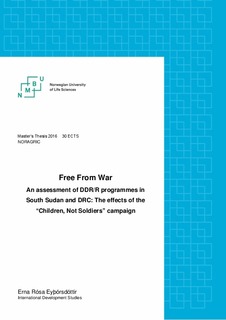| dc.contributor.advisor | Kjosavik, Darley Jose | |
| dc.contributor.author | Eyþórsdóttir, Erna Rósa | |
| dc.date.accessioned | 2016-08-23T11:37:42Z | |
| dc.date.available | 2016-08-23T11:37:42Z | |
| dc.date.issued | 2016-08-23 | |
| dc.identifier.uri | http://hdl.handle.net/11250/2401061 | |
| dc.description.abstract | This study examines and evaluates the process of the DDR/R programmes in the Democratic Republic of Congo and South Sudan and how these programmes contribute to sustainable peacebuilding and prevent recruitment of children. In addition, the study will examine the process of the Release and Reintegration programmes for children in both countries and the effects of the United Nations “Children, Not Soldiers” campaign on these programmes. Data for this study was mainly collected through secondary literature and empirical data was collected by using qualitative approach where the researcher conducted two unstructured interviews with UNICEF specialists for further analysis.
The main results were that both South Sudan and DRC have faced huge obstacles in
their efforts to implement effective DDR/R programmes causing combatants either to wait a long time for reintegration or not participating in the programme at all. Nonetheless, the
DDR/R programme in DRC affected the substantial increase in the numbers of children
separated from armed groups and forces in 2015 and the agreement between the Cobra
Faction and the government of South-Sudan also affected the release of large numbers of children. Despite many obstacles like funding and ongoing conflict, The Release and
Reintegration programmes assist large numbers of CAAFG in both DRC and South Sudan where they receive medical care, psychosocial support, education, social skills training and reintegration support where the child protection agents mediate with the children’s communities in order to prevent blame and stigma. These programmes therefore contribute greatly to sustainable peacebuilding and prevention of recruitment and re-recruitment of children. The Children, Not Soldiers campaign is a huge contribution to sustainable peacebuilding and the prevention of child recruitment in South Sudan and DRC. The campaign has gained a compliance from both countries who have signed action plans where they commit to ending recruitment and use of children by their military forces. Both countries have made efforts to achieve some of the key actions listed in the action plan but South Sudan´s government forces are still recruiting children. DRC however, has stopped recruiting children to their military forces. The campaign has affected the release of large numbers of children through the Release and Reintegration Programmes in both countries. These programmes are coordinated by UNICEF in cooperation with the governments and NGO´s. | nb_NO |
| dc.language.iso | eng | nb_NO |
| dc.publisher | Norwegian University of Life Sciences, Ås | |
| dc.subject | DDR/R | nb_NO |
| dc.subject | CAAFG | nb_NO |
| dc.subject | Release and Reintegration | nb_NO |
| dc.subject | South Sudan | nb_NO |
| dc.subject | DRC | nb_NO |
| dc.subject | Democratic Republic of Congo | nb_NO |
| dc.subject | Children, Not Soldiers | nb_NO |
| dc.title | Free From War: an assessment of DDR/R programmes in South Sudan and DRC : the effects of the "Children, Not Soldiers" campaign | nb_NO |
| dc.type | Master thesis | nb_NO |
| dc.subject.nsi | VDP::Social science: 200::Political science and organizational theory: 240::Comparative politics: 241 | nb_NO |
| dc.subject.nsi | VDP::Social science: 200::Political science and organizational theory: 240::International politics: 243 | nb_NO |
| dc.source.pagenumber | 75 | nb_NO |
| dc.description.localcode | M-DS | nb_NO |
